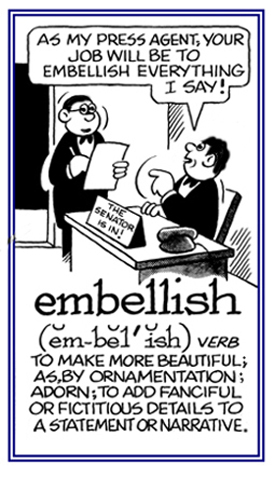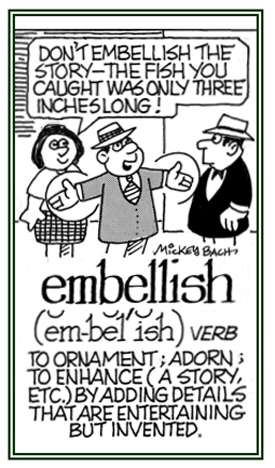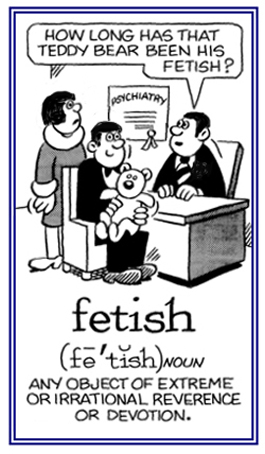-ish
(Old English: a suffix meaning, characteristic of, like, tending to; of or relating to, from; somewhat, approximately; or a verb ending)
A suffix used to form adjectives from nouns and from adjectives. It refers to "relation, resemblance, similarity", and sometimes has a diminutive force; such as, "selfish, boyish, brutish; whitish, somewhat white".
A verb ending, originally appearing in certain verbs of French origin; such as, "abolish, cherish, finish, furnish, garnish", and "impoverish".
embellish (verb), embellishes; embellished; embellishing
1. To increase the beauty of something by adding ornaments or decorations: The author embellished his book with colorful illustrations and gold lettering on the cover.
2. To make a description more interesting by inventing, exaggerating, or adding special details: Sam was embellishing his speech with humorous quotations.
4. Etymology: from Old French embellier, "to make, or to render beautiful"; from Latin em, "into, in" + bellus, "beauty".

© ALL rights are reserved.

© ALL rights are reserved.
Go to this Word A Day Revisited Index
2. To make a description more interesting by inventing, exaggerating, or adding special details: Sam was embellishing his speech with humorous quotations.
Jason likes to embellish his political speeches with fictitious statements that are not true.
3. In music, to add extra notes, accents, or trills to a melody to make it more beautiful or interesting: During Lina's concert, she was embellishing her music with special rapid alternations of tones.4. Etymology: from Old French embellier, "to make, or to render beautiful"; from Latin em, "into, in" + bellus, "beauty".


Go to this Word A Day Revisited Index
so you can see more of Mickey Bach's cartoons.
establish (verb), establishes; established; establishing
1. To create or set up something so that it will last for a long time; to found: Janet's school was established and opened for the first time many years ago.
2. To start or to have a connection with someone, with a group, or with a country: Susan tried to start and establish a new relationship with her cousin who lived in another country.
3. To confirm that a fact, data, or information is absolutely true: In order to establish the reason why Sam died so suddenly, an autopsy had to be performed.
4. To achieve a good reputation, status, or a good personal quality: Mrs. Timmons established a name for herself after her first novel sold so well and acclaimed such good reviews.
2. To start or to have a connection with someone, with a group, or with a country: Susan tried to start and establish a new relationship with her cousin who lived in another country.
3. To confirm that a fact, data, or information is absolutely true: In order to establish the reason why Sam died so suddenly, an autopsy had to be performed.
4. To achieve a good reputation, status, or a good personal quality: Mrs. Timmons established a name for herself after her first novel sold so well and acclaimed such good reviews.
evanish (verb), evanishes; evanished; evanishing
1. To vanish; to disappear.
2. To cease to be.
3. To escape from sight or perception.
2. To cease to be.
3. To escape from sight or perception.
Vanish is more generally used than evanish.
extinguish (verb), extinguishes; extinguished; extinguishing
1. Something that a person enjoys very much in a way that is unusual, nonsensical, or unreasonable: When Mary saw her daughter’s collection of pencils, she thought it was quite an uncommon fetish.
2. An irrational or abnormal fixation or preoccupation about doing something; an obsession: Joe had a fetish about his favorite football team and collected everything he could find about it, including banners, streamers, T-shirts, posters, photos, newspaper articles, etc. and hanging up many of them on the walls of his bedroom!

© ALL rights are reserved.
Go to this Word A Day Revisited Index
2. An irrational or abnormal fixation or preoccupation about doing something; an obsession: Joe had a fetish about his favorite football team and collected everything he could find about it, including banners, streamers, T-shirts, posters, photos, newspaper articles, etc. and hanging up many of them on the walls of his bedroom!

Go to this Word A Day Revisited Index
so you can see more of Mickey Bach's cartoons.
finish (verb), finishes; finished; finishing
1. To do the last part or to reach the end of something so that it is complete: Shirley finished her speech to her fellow students and left the podium for the next speaker.
2. To stop happening; that is, to bring to an end or to terminate something: The meeting finished on a negative note.
3. To eat, to consume, to drink, or to use all of something so that there is nothing left: Ted's boy was in a hurry to finish his meal so he could go see a movie.
4. To be in a particular position at the end of a race or a competition: Shawn and Tony's football team was expected to finish in second place.
5. To rub a surface, or to put a substance on it, in order to make it smooth and attractive: After the polish was applied to the car, rubbed off, and everything was finished, it looked like a new vehicle.
6. To bring about the ruin of something: Some investors believe the stock market crash was finished or ended for many financial speculators.
2. To stop happening; that is, to bring to an end or to terminate something: The meeting finished on a negative note.
3. To eat, to consume, to drink, or to use all of something so that there is nothing left: Ted's boy was in a hurry to finish his meal so he could go see a movie.
4. To be in a particular position at the end of a race or a competition: Shawn and Tony's football team was expected to finish in second place.
5. To rub a surface, or to put a substance on it, in order to make it smooth and attractive: After the polish was applied to the car, rubbed off, and everything was finished, it looked like a new vehicle.
6. To bring about the ruin of something: Some investors believe the stock market crash was finished or ended for many financial speculators.
flor
A covering of yeasts and bacteria and other micro-organisms which form on the surfaces of some wines during fermentation.
flourish (verb), flourishes; flourished, flourishing
1. To grow well or luxuriantly; to thrive well: The flowers flourished beautifully in Ned's and Raphael's back yard.
2. To be strong and healthy or to grow well; especially, because conditions are right.
3. To sustain continuous steady strong growth: There are those who believe that the economy is flourishing more and more in China.
4. To be in a period of highest productivity, excellence, or influence: Henry was a novelist who flourished by writing many stories for books.
5. Etymology: "to blossom, grow", from Old French floriss-, stem of florir, "blossom, flower, bloom, flourish", from Latin florere, "to bloom, to blossom, to flower"; figuratively "to flourish, be prosperous", is from flos, "a flower".
2. To be strong and healthy or to grow well; especially, because conditions are right.
3. To sustain continuous steady strong growth: There are those who believe that the economy is flourishing more and more in China.
4. To be in a period of highest productivity, excellence, or influence: Henry was a novelist who flourished by writing many stories for books.
5. Etymology: "to blossom, grow", from Old French floriss-, stem of florir, "blossom, flower, bloom, flourish", from Latin florere, "to bloom, to blossom, to flower"; figuratively "to flourish, be prosperous", is from flos, "a flower".
furnish
garnish
Gaulish
impoverish
lavish (verb), lavishes; lavished; lavishing
1. To give or to bestow in abundance: As a waiter, Henry lavished a great deal of attention on his customers.
2. Expended, bestowed, or occurring in profusion: Monroe was lavishing a great deal of money for his mother's 96th birthday party.
3. To expend or give in great amounts or without limit: Her public relations budget allowed Heather to lavish gifts on her prospective clients, hoping to get their contracts for her boss.
4. Etymology: first recorded in 1469, from Middle French lavasse, from Old French lavache, "torrent (of rain), deluge", from laver, "to wash"; and from Latin lavare, "to wash".
2. Expended, bestowed, or occurring in profusion: Monroe was lavishing a great deal of money for his mother's 96th birthday party.
3. To expend or give in great amounts or without limit: Her public relations budget allowed Heather to lavish gifts on her prospective clients, hoping to get their contracts for her boss.
4. Etymology: first recorded in 1469, from Middle French lavasse, from Old French lavache, "torrent (of rain), deluge", from laver, "to wash"; and from Latin lavare, "to wash".
mobbish
parish


